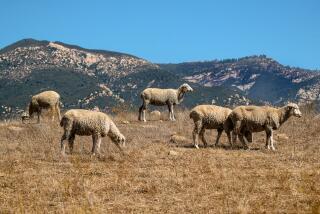Pro-Ostrich Argument Is for the Birds : Despite owner’s claim, the Chatsworth herd indeed constitutes a commercial enterprise
- Share via
The legal pendulum has swung against ostriches in the northwest Valley, and it’s probably for the best.
The case involved a property owner in Chatsworth’s exclusive Monteria Estates whose herd of ostriches and emus sometimes numbered upward of 800. Statistically speaking, that is enough ostriches and emus to fill every seat on two Boeing 747s.
Breeding the birds is in vogue nowadays: Ostriches are depicted as giant schmoos ready to save the world with wonderful meat, great leather, feathers, etc. In earlier generations, folks dreamed of wealth from chinchillas and earthworms.
But ostriches’ strong points do not include neighborliness, and their proliferation among human populations is creating conflicts. The people in Chatsworth objected to the noise and smell, which they described in vivid detail. Zoning officials ordered the big-bird population cut to zero.
The case, now evidently headed for court, turns partly on the distinction between agricultural use, for which the land is zoned, and commercial use, which brings it under the law against nuisances. Property owner David Mohilef claims he is non-commercial because he merely houses the birds for eight months, observing them for desirable traits. Then they are shipped off to grow to breeding size.
The officials rejected the argument on reasonable grounds. Mohilef’s place is part of the far-flung world of ostrich commerce, and he is part owner of the birds. Given their size and number, the operation sounds as if it has resembled a feedlot with an R & D wing more than a biology lab.
Taking the long view, the dispute has a familiar ring.
The writer Catherine Mulholland remembers that not long after World War II, before Monteria Estates acquired its name and guarded gate, the actor known as Sabu the Elephant Boy lived there with one or more elephants. “You could hear them trumpeting all over Chatsworth.”
Another resident, Virginia Ditto, remembers that the elephants went away after Sabu’s neighbors objected, probably by writing polite notes.
“In those days,” she says, “people cared what the neighbors thought.”
More to Read
Sign up for Essential California
The most important California stories and recommendations in your inbox every morning.
You may occasionally receive promotional content from the Los Angeles Times.












